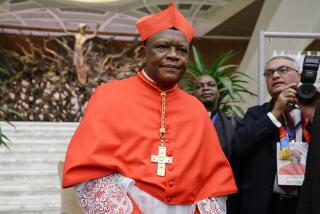Lutheran-Episcopalian Unity Plan Halted : Churches: The two bodies had been working on a ‘full Communion’ agreement. Questions arise on religious doctrine.
- Share via
The bishops of the Evangelical Lutheran Church in America, expressing concern that church doctrine may be compromised, have called for a halt in steps toward full Communion with the Episcopal Church.
By a vote of 45 to 12, the Conference of Bishops, meeting in New Orleans this week, voted to recommend to the church council of the 5.2-million-member denomination that “no action be taken by the ELCA (toward Communion) until there is agreement that the doctrine and practice of this church are not compromised.”
The action brought to a halt two decades of theological dialogue that climaxed in January when the presiding bishops of the two churches signed a “concordat” proposing “full Communion.”
Under terms of the agreement, clergy from the two bodies would be able to serve congregations in the other denomination and members would be able to receive Holy Communion in churches of either body.
At the time, the agreement was hailed as a historic breakthrough in ecumenical relations and would have brought the two churches, with a combined membership of more than 8 million, as close together as possible without actual merger.
But the Lutheran bishops apparently decided that ecumenical relations should be put on the back burner for the time being. Others expressed fear that the agreement would compromise historic Lutheran understandings of the ministry, especially the role and office of the bishop, or episcopate, as it is known.
Bishop William Lazareth of New York, one of those leading the opposition to taking action on the agreement, said that under terms of the concordat, “Episcopalians need not subscribe officially to Lutheran faith while Lutherans must adhere officially to Episcopalian structure.”
Lazareth apparently was referring to a provision of the agreement that would require future bishops of the ELCA to be consecrated by Episcopal or Anglican bishops as well as Lutherans. The Episcopal Church--like Roman Catholicism--lays claim to the “historic episcopate,” under which it is believed that there is an unbroken line of succession among the church’s hierarchy that stretches back to the apostles of Christ. Not all Lutherans make such a claim.
Episcopal leaders were stunned by the Lutheran bishops’ action.
Presiding Episcopal Bishop Edmond Browning called it “unexpected” and sought to put the best face on it, saying, “It is a measure of their positive commitment to ecumenical steps forward that they wish to find an appropriate time to give undivided attention to these important matters.”
But ELCA Bishop Harold Jansen of the Metropolitan Washington Synod said the hierarchy’s vote was “not simply a plea for time.” He noted that the two churches come from “diverse histories” and “we cannot just treat this as something thrown into a blender.”
The two churches were expected to vote on the agreement at their conventions this summer. The ELCA church council, which meets in mid-April, must decide whether to accept their bishops’ recommendations that the process not go forward.
Lutheran Presiding Bishop Herbert Chilstrom said he has the impression the young ELCA--a 1988 merger of three Lutheran groups--”is becoming overburdened with demands in too many areas.”
“Some of these demands cannot be put off,” he said. “We need to come to clarity as soon as possible on such basic issues as abortion, the ministry and ecumenism. In other areas--such as study and action on dialogue reports (like the Lutheran-Episcopal proposal)--I believe we owe it to ourselves and to our sister churches to give those issues our undivided attention at a more appropriate time,” he said.
More to Read
Sign up for Essential California
The most important California stories and recommendations in your inbox every morning.
You may occasionally receive promotional content from the Los Angeles Times.













